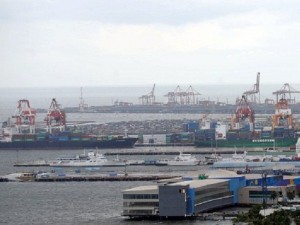Increase exports to Australia, NZ, PH firms urged

Philippine businesses are urged to take advantage of potentially lucrative export opportunities in Australia and New Zealand, which have a growing demand for high-value goods and services. AFP PHOTO
MANILA, Philippines—Philippine businesses are urged to take advantage of potentially lucrative export opportunities in Australia and New Zealand, which have a growing demand for high-value goods and services.
Jeremiah C. Reyes, from the Bureau of International Trade Relations (BITR) of the Department of Trade and Industry, said in a statement that local manufacturers could benefit from the Asean-Australia-New Zealand Free Trade Agreement (AANZFTA) by catering to the rising demand for food, transport, chemicals, clothing and accessories, appliances and home furnishings.
The AANZFTA is a comprehensive free trade agreement that the Association of Southeast Asian Nations entered into with Australia and New Zealand and that came into force on Jan. 1, 2010.
It spells out commercial benefits in various areas including economic cooperation, competition policy, intellectual property, e-commerce, investment, and trade in goods and services, according to the statement from the Philippine Exporters Confederation Inc. (Philexport).
“Under the trade agreement, all products exported to ANZ by the 10-nation Asean will have zero tariffs by 2020. From now until 2020, exporters can expect an increasingly expanding list of commodities subjected to zero tariff status in the ANZ,” Reyes explained.
Article continues after this advertisement“This means Filipino traders should keep an eye out for Australian and New Zealand tariff reduction developments and use this knowledge to ensure a more targeted and successful marketing strategy,” he added.
Article continues after this advertisementUnder the AANZFTA, 96.5 percent of Asean product lines bound for Australia will have zero tariffs this year, including processed food, beverages, minerals, inorganic and organic chemicals, leather goods, footwear, basketware, ceramics, fine and costume jewelry, appliances, auto and auto parts, ships and boats, furniture, women’s undergarments, cotton apparel, wool overcoats, trousers of synthetic fiber, hosiery, socks, gloves, shawls and ties, Philexport explained.
By 2015, tariff-free perks will expand to cover 96.8 percent of commodities, including men’s synthetic suits and dresses and women’s wool jackets and suits, while in 2020, zero tariffs shall apply to all lines, including other articles of apparel, carpets, and wooden office furniture, the group added.
In New Zealand, meanwhile, tariffs for all imported products by 2020 will be removed, including for chewing gum, sweet biscuits, soy sauce, wooden doors, furniture of plastics, and other articles of clothing.